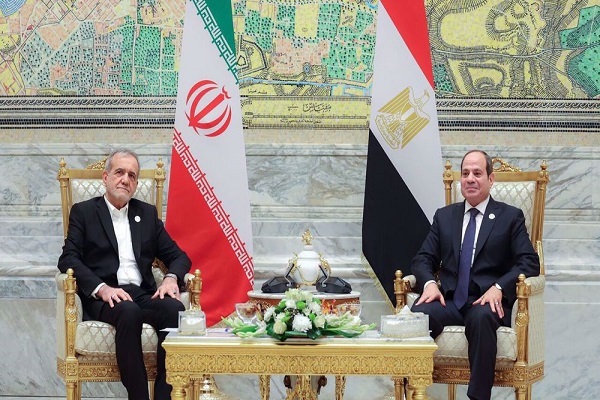
TABNAK, Dec 20: The two presidents met on on Thursday on the sidelines of the 11th summit of the leaders of the D-8 Organization for Economic Cooperation in the Egyptian capital, Cairo, where they reviewed the recent measures taken to restore the bilateral ties.
Pezeshkian emphasized the necessity of promoting economic cooperation, and the continued talks between Tehran and Cairo, which have not had political ties for more than four decades.
Mehdi Sanaei, a senior political aide to Pezeshkian, had noted earlier that “good dialogue” was held between the heads of the two countries last month, adding that “political talks and appropriate actions have started between the two countries.”
“There is the necessary will for both countries to resume relations, and we hope that with the measures that have been taken and are being taken, we will go as far as to reopen embassies in the near future,” said the advisor.
During the meeting, the two presidents also discussed regional developments, with Pezeshkian stressing the importance of sharing capabilities and enhancing cooperation among Muslim countries within the framework of regional and international treaty organizations such as the D-8 and the Organization of Islamic Cooperation.
He also noted that unity is “the most essential need” of today’s Muslim world.
"All Islamic countries should strive to expand interaction and dialogue within the Islamic world according to their share, and overcome existing differences, as these differences provide a basis for foreign interventions," he stressed.
For his part, Sisi underscored that West Asia has faced serious threats, amid the recent developments in Gaza, Lebanon and Syria.
He described the latest Israeli aggression on Syria as unprecedented, expressing his country’s support for the formation of an inclusive government in Syria.
After armed groups, led by Hayat Tahrir al-Sham (HTS) militants, captured the Syrian capital, which led to the fall of President Bashar al-Assad’s government earlier this month, Israel swiftly moved in and seized the so-called buffer zone separating the Israeli-occupied Golan Heights from the Syrian land.
Israeli troops have advanced deeper into Syria, with the regime's warplanes conducting hundreds of aerial assaults on the country.
Pezeshkian to Erdogan: Syria’s territorial integrity must be preserved
Also on Thursday, Pezeshkian met with his Turkish counterpart Recep Tayyip Erdogan where he emphasized the need for maintaining Syria's territorial integrity.
"Any developments in Syria must preserve the country's territorial integrity, and even the slightest infringement on Syria's territorial integrity is absolutely unacceptable," Pezeshkian said.
He stressed the urgent need to halt the Israeli aggressions in West Asia, urging all Muslim nations to "fulfill their duty” and combat the Israeli crimes.
“If there is unity and cohesion in the Islamic Ummah, this regime will not dare take such actions," Pezeshkian stated.
Erdogan also said preserving the territorial integrity of Syria was important for Turkey. He also stressed the need for a halt to the Israeli attacks on the Arab country.
He expressed hope that stability and security would be restored to the country as soon as possible.
The Turkish president also voiced his support for the underway ceasefire in Lebanon, and the need for a truce in Gaza.
The two presidents also agreed on the acceleration of the implementation of trade agreements between the two countries.
Pezeshkian calls for unified currency among Muslim nations
In a separate meeting in Cairo on the same day, Pezeshkian held talks with Pakistan's Prime Minister Muhammad Shehbaz Sharif.
Pointing to the importance of strengthening economic ties among Muslim nations, Pezeshkian called for establishing a common currency.
The Pakistani premier expressed his support for Pezeshkian's idea of creating a unified currency and utilizing the capacities of shared markets among Muslim nations.
Shehbaz Sharif also underscored the significance of developing cooperation among the Islamic countries to confront common threats, condemning the Israeli criminal acts against Gaza, Lebanon, and Syria, as well as the violation of Iran’s sovereignty.
During their meeting, Pezeshkian stressed that the relationship between Iran and Pakistan are friendly and brotherly, and called for enhancing mutual cooperation between the two countries, while Sharif highlighting the deep commonalities between Tehran and Islamabad.